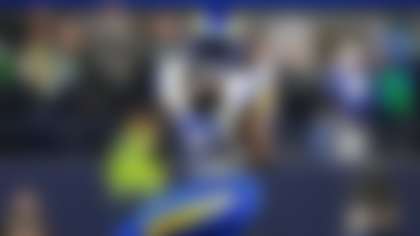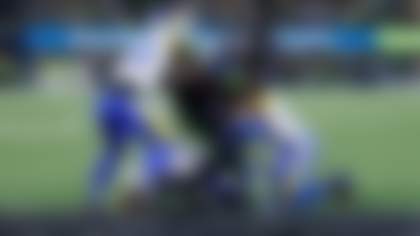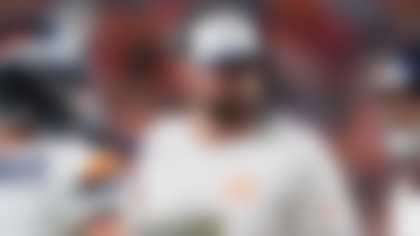NEW YORK -- Roger Goodell's hard line on discipline, aimed so far at players, came down this time on a coach and a team.
New England coach Bill Belichick was fined the NFL maximum of $500,000 Thursday and the Patriots were ordered to pay $250,000 for spying on an opponent's defensive signals.
The commissioner also ordered the team to give up next year's first-round draft choice if it reaches the playoffs and second- and third-round picks if it doesn't. If the Patriots lose their first-rounder next season they still will have a first-round pick, obtained from San Francisco in the deal that brought Moss from Oakland.
"This episode represents a calculated and deliberate attempt to avoid longstanding rules designed to encourage fair play and promote honest competition on the playing field," Goodell said in a letter to the Patriots.
Reached at his home, Patriots owner Robert Kraft declined to comment.
The videotaping came to light after a camera was confiscated from Patriots video assistant Matt Estrella while he was on the New York Jets' sideline during New England's 38-14 win last Sunday at Giants Stadium.
The Jets issued a statement saying, "We support the commissioner and his findings. The focus of our organization remains on the upcoming game against Baltimore."
The NFL said the camera was seized before the end of the first quarter and had no impact on the game.
Goodell said he considered suspending Belichick but didn't "largely because I believe that the discipline I am imposing of a maximum fine and forfeiture of a first-round draft choice, or multiple draft choices, is in fact more significant and long-lasting, and therefore more effective, than a suspension."
New England, strengthened by the addition of Randy Moss and two other first-rate wide receivers as well as linebacker Adalius Thomas, is considered one of the favorites to win the Super Bowl for the fourth time since the 2001 season.
NFL rules state "no video recording devices of any kind are permitted to be in use in the coaches' booth, on the field, or in the locker room during the game." They also say all video for coaching purposes must be shot from locations "enclosed on all sides with a roof overhead."
That was re-emphasized in a memo sent Sept. 6 to NFL head coaches and general managers. In it, Ray Anderson, the league's executive vice president of football operations wrote: "Videotaping of any type, including but not limited to taping of an opponent's offensive or defensive signals, is prohibited on the sidelines, in the coaches' booth, in the locker room, or at any other locations accessible to club staff members during the game."
The NFL statement said Goodell believed Patriots owner Robert Kraft was unaware of Belichick's actions.
I accept full responsibility for the actions that led to tonight's ruling. Once again, I apologize to the Kraft family and every person directly or indirectly associated with the New England Patriots for the embarrassment, distraction and penalty my mistake caused. I also apologize to Patriots fans and would like to thank them for their support during the past few days and throughout my career.
As the Commissioner acknowledged, our use of sideline video had no impact on the outcome of last week's game. We have never used sideline video to obtain a competitive advantage while the game was in progress.
Part of my job as head coach is to ensure that our football operations are conducted in compliance of the league rules and all accepted interpretations of them. My interpretation of a rule in the Constitution and Bylaws was incorrect.
With tonight's resolution, I will not be offering any further comments on this matter. We are moving on with our preparations for Sunday's game.
But it said the commissioner believed penalties should be imposed on the club because "Coach Belichick not only serves as the head coach but also has substantial control over all aspects of New England's football operations. His actions and decisions are properly attributed to the club."
The action against Belichick is the latest in a series of harsh disciplinary actions taken by Goodell, who took office last Sept. 1, succeeding Paul Tagliabue.
The most notable were the indefinite suspension of Atlanta quarterback Michael Vick after he pleaded guilty to a federal dogfighting conspiracy charge and the one-year suspension of Tennessee cornerback Adam "Pacman" Jones after numerous run-ins with police.
On Wednesday, Belichick issued a one-paragraph statement 10 minutes before his regular availability, saying he had spoken with Goodell "about a videotaping procedure during last Sunday's game and my interpretation of the rules."
"Although it remains a league matter, I want to apologize to everyone who has been affected, most of all ownership, staff and players," he said.
NFL coaches long have suspected opponents of spying. In the early 1970s, the late George Allen, coach of the Washington Redskins, routinely would send a security man into the woods surrounding the team's practice facility because he suspected there were spies from other teams there.
And coaches like Seattle's Mike Holmgren and Philadelphia's Andy Reid, among others, always cover their mouths when calling plays from the sideline because they fear other teams have lip readers trying to determine their calls.
The most recent hefty fine against a coach was in 2005, when Tagliabue fined former Minnesota coach Mike Tice $100,000 for scalping Super Bowl tickets.
Last November, Goodell fined Tennessee coach Jeff Fisher, co-chairman of the competition committee, $12,500 for criticizing officials. He also fined Pittsburgh owner Dan Rooney, one of his mentors and the man who informed him he had been elected commissioner, for the same violation.
Copyright 2007 by The Associated Press. All Rights Reserved



